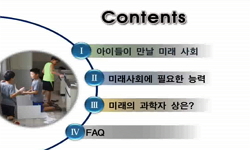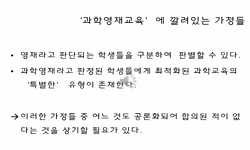This study aims to develop a scientific creativity task which science-gifted elementary students can conduct on a field trip to a botanical garden, and to analyze the results from conducting the task. For this, 38 science- gifted fifth-graders from th...
http://chineseinput.net/에서 pinyin(병음)방식으로 중국어를 변환할 수 있습니다.
변환된 중국어를 복사하여 사용하시면 됩니다.
- 中文 을 입력하시려면 zhongwen을 입력하시고 space를누르시면됩니다.
- 北京 을 입력하시려면 beijing을 입력하시고 space를 누르시면 됩니다.

식물원 야외체험학습에서 활용 가능한 과학 창의성 과제 개발 - 초등과학영재학생에의 적용 - = Development of the Scientific Creativity Task for a Field Trip to Botanical Garden- Application to Science-Gifted Elementary Students -
한글로보기https://www.riss.kr/link?id=A107143975
- 저자
- 발행기관
- 학술지명
- 권호사항
-
발행연도
2020
-
작성언어
Korean
- 주제어
-
등재정보
KCI등재
-
자료형태
학술저널
- 발행기관 URL
-
수록면
506-521(16쪽)
-
KCI 피인용횟수
0
- DOI식별코드
- 제공처
-
0
상세조회 -
0
다운로드
부가정보
다국어 초록 (Multilingual Abstract)
This study aims to develop a scientific creativity task which science-gifted elementary students can conduct on a field trip to a botanical garden, and to analyze the results from conducting the task. For this, 38 science- gifted fifth-graders from the Science-Gifted Education Center, located at the Office of Education, participated in a field trip to a botanical garden, as a part of their program. Prior to the program, researchers developed a scientific creativity task for outdoor education program, along with science education specialists and teachers. The tasks were to observe plants, and to create something new and useful, or, in other words, scientifically creative, based on the plants’ characteristics. The students could submit at most three ideas. Also, they assessed their own ideas, and selected an idea that they thought was the most creative. The results were analyzed by using the scientific creativity formula. The main findings from this study are as follows. First, it was found that the scientific creativity formula had an upward bias in assessing originality. Second, the students tended to assess the usefulness of their own ideas more generously. Third, the correlation between self-assessment results and scores from the scientific creativity formula for originality was r=.43. Fourth, in formula-based assessments, the correlation between originality scores and usefulness scores was relatively high, at r=.56. Fifth, the correlation between a student’s scientific creativity score and the number of his or her ideas was very low, at r=.23. Sixth, when the ideas chosen as the most creative by students were compared with the ideas that had the highest scores in formula-based assessments, it was shown that 8 out of 19 students (42.1%) did not choose the idea that appeared to be the most creative when graded by the formula. This study is concluded by discussing the lessons from the scientific creativity task analysis for primary science education and gifted education.
참고문헌 (Reference)
1 김민주, "초등과학영재학생의 발표에 대한 인식 및 발표의 자발성과 과학창의성의 관계 분석" 한국초등과학교육학회 38 (38): 331-344, 2019
2 김민주, "초등과학영재학생의 과학창의성에 대한 자기 평가, 동료 평가의 비교 분석" 한국초등과학교육학회 38 (38): 439-452, 2019
3 김민주, "초등과학영재학생의 과학창의성과 다중지능의 관계 - 생명 영역을 중심으로 -" 한국초등과학교육학회 39 (39): 369-381, 2020
4 김현주, "초등과학영재학생의 과학지식과 과학창의성의 관계- 생명 영역을 중심으로 -" 한국초등과학교육학회 39 (39): 382-398, 2020
5 이재무, "체육영재, 학업영재, 일반 초등학생의 다중지능, 정서지능 특성비교" 한국체육과학회 19 (19): 609-622, 2010
6 조연순, "창의적 문제 해결력 신장을 위한중학교 과학 교육과정 개발" 20 (20): 329-343, 2000
7 한기순, "창의성의 영역 한정성과 영역 보편성에 관한 분석과 탐구" 10 (10): 47-69, 2000
8 김명숙, "창의성의 영역 특수성과 영역 일반성의 절충적 대안 탐색: 창의적 잠재력과 창의적 수행을 중심으로" 한국교육심리학회 19 (19): 1139-1158, 2005
9 김영채, "창의력의 영역 보편성과 특수성: 쟁점과 TTCT 창의력 검사의 분석" 대한사고개발학회 8 (8): 1-29, 2012
10 최인수, "유아용 창의성 측정도구에 관한 고찰" 20 (20): 139-166, 2000
1 김민주, "초등과학영재학생의 발표에 대한 인식 및 발표의 자발성과 과학창의성의 관계 분석" 한국초등과학교육학회 38 (38): 331-344, 2019
2 김민주, "초등과학영재학생의 과학창의성에 대한 자기 평가, 동료 평가의 비교 분석" 한국초등과학교육학회 38 (38): 439-452, 2019
3 김민주, "초등과학영재학생의 과학창의성과 다중지능의 관계 - 생명 영역을 중심으로 -" 한국초등과학교육학회 39 (39): 369-381, 2020
4 김현주, "초등과학영재학생의 과학지식과 과학창의성의 관계- 생명 영역을 중심으로 -" 한국초등과학교육학회 39 (39): 382-398, 2020
5 이재무, "체육영재, 학업영재, 일반 초등학생의 다중지능, 정서지능 특성비교" 한국체육과학회 19 (19): 609-622, 2010
6 조연순, "창의적 문제 해결력 신장을 위한중학교 과학 교육과정 개발" 20 (20): 329-343, 2000
7 한기순, "창의성의 영역 한정성과 영역 보편성에 관한 분석과 탐구" 10 (10): 47-69, 2000
8 김명숙, "창의성의 영역 특수성과 영역 일반성의 절충적 대안 탐색: 창의적 잠재력과 창의적 수행을 중심으로" 한국교육심리학회 19 (19): 1139-1158, 2005
9 김영채, "창의력의 영역 보편성과 특수성: 쟁점과 TTCT 창의력 검사의 분석" 대한사고개발학회 8 (8): 1-29, 2012
10 최인수, "유아용 창의성 측정도구에 관한 고찰" 20 (20): 139-166, 2000
11 임성만, "영역 특수적인 입장에서의 과학적 창의성에 대한 정의, 구성요인에 대한 탐색" 과학교육연구소 33 (33): 31-43, 2009
12 최일호, "새로운 생각은 어떻게 가능한가 : 전문분야 창의성에 대한 학습과정 모형 접근" 20 (20): 409-428, 2001
13 임채성, "뇌기반 진화적 접근법에 따른 창의적 과학 문제해결 지도 모형 개발" 한국생물교육학회 40 (40): 429-452, 2012
14 최경희, "구성주의 특성에 따른 과학교육" 2 (2): 91-122, 2002
15 임채성, "과학창의성 평가 공식의 개발과 적용" 한국초등과학교육학회 33 (33): 242-257, 2014
16 박종원, "과학적 창의성 모델의 제안-인지적 측면을 중심으로-" 한국과학교육학회 24 (24): 375-386, 2004
17 정덕호, "과학영재와 일반학생들의 창의적 사고 편향에 대한 분석" 한국영재학회 21 (21): 175-191, 2011
18 한기순, "과학영재와 일반학생들 간의 사고 양식과 지능 및 창의성간의 관계 비교" 한국교육심리학회 18 (18): 49-68, 2004
19 성진숙, "과학에서의 창의적 문제해결력에 영향을 미치는 제 변수 분석: 확산적 사고, 과학 지식, 내.외적 동기, 성격 특성 및 가정 환경" 한국열린교육학회 11 (11): 219-237, 2003
20 송성수, "과학사의 사례를 활용한 과학자의 창의성에 관한 탐색적 연구: 다윈, 에디슨, 아인슈타인을 중심으로" 과학교육연구소 52 (52): 227-236, 2013
21 정현철, "과학 창의성 계발을 위한 프로그램 개발 - 이론과 예시를 중심으로 -" 한국지구과학회 23 (23): 334-348, 2002
22 Plucker, J. A., "Why isn’t creativity more important to educational psychologists? Potentials, pitfalls, and future directions in creativity research" 39 : 83-96, 2004
23 Mumford, M. D., "Where have we been, where are we going? Taking stock in creativity research" 15 (15): 107-120, 2003
24 Merrotsy, P., "Tolerance of ambiguity : A trait of the creative personality?" 25 (25): 232-237, 2013
25 Amabile, T. M., "The social psychology of creativity : A componential conceptualization" 45 (45): 357-, 1983
26 Ross, J. A., "The reliability, validity, and utility of self-assessment" 11 (11): 10-, 2006
27 Korfiatis, K. J., "The living world in the curriculum : Ecology, an essential part of biology learning" 46 (46): 125-127, 2012
28 Sadler, P. M., "The impact of self-and peer-grading on student learning" 11 (11): 1-31, 2006
29 Sung, Y. T., "The design and application of a web-based self-and peerassessment system" 45 (45): 187-202, 2005
30 Baer, J., "The case for domain specificity of creativity" 11 (11): 173-177, 1998
31 Mayer, R. E., "Teaching students to solve insight problems : Evidence for domain specificity in creativity training" 14 : 389-402, 2004
32 Amabile, T. M., "Social psychology of creativity : A consensual assessment technique" 43 : 997-1013, 1982
33 Simonton, D. K., "Origins of genius: Darwinian perspectives on creativity" Oxford University Press 1999
34 Basadur, M., "Optimal ideation-evaluation ratios" 8 : 63-75, 1995
35 Han, K. S., "Multiple creativities? Investigating domain-specificity of creativity in young children" 46 (46): 98-109, 2002
36 Olsen, R. V., "Learning about students’ knowledge and thinking in science through large-scale quantitative studies" 16 (16): 403-, 2001
37 Simonton, D. K., "Integrating the mind: Domain general versus domain specific processes in higher cognition" Psychology Press 351-367, 2007
38 Baer, J., "How divergent thinking tests mislead us:Are the Torrance Tests still relevant in the 21st century? The Division 10 debate" 5 (5): 309-313, 2011
39 Sternberg, R. J., "Handbook of human creativity" Cambridge University Press 1998
40 Lubart, T. I., "Handbook of creativity" Cambridge University Press 339-350, 1999
41 Kogan, N., "Handbook of child psychology: Vol. 3. Cognitive development" Wiley 628-706, 1983
42 Wilson, C., "Effective approaches to connect with nature" Department of Conservation 2011
43 Runco, M. A., "Divergent thinking as an indicator of creative potential" 24 (24): 66-75, 2012
44 Plucker, J. A., "Creativity: From potential to realization" American Psychological Association 153-167, 2004
45 Sternberg, R. J., "Creativity: From potential to realization" American Psychological Association 2004
46 Runco, M. A., "Creativity: From potential to realization" American Psychological Association 21-30, 2004
47 Weisberg, R. W., "Creativity: Beyond the myth of genius" WH Freeman 1993
48 Craft, A., "Creativity in education" A&C Black 2001
49 Baer, J., "Creativity and divergent thinking: A taskspecific approach" Erlbaum 1993
50 Baer, J., "Creativity across domains:Faces of the Muse" Laurence Erlbaum Associates 313-320, 2005
51 Kaufmann, G., "Creative management" STAGE Publication 2001
52 Ernest, P., "Constructivism in education" Lawrence Erlbaum Associates 1995
53 Singer, D. G., "Children’s pastimes and play in sixteen nations: Is free-play declining?" 1 (1): 283-312, 2009
54 Kim, K. H., "Can we trust creativity tests? A review of the Torrance Tests of Creative Thinking(TTCT)" 18 (18): 3-14, 2006
55 Bouzidi, L., "Can online peer assessment be trusted?" 12 (12): 257-268, 2009
56 Campbell, D. T., "Blind variation and selective retention in creative thought as in other knowledge processes" 67 : 380-400, 1960
57 Simonton, D. K., "Beyond knowledge: Extracognitive aspects of developing high ability" Routledge 39-72, 2004
58 Kaufman, J. C., "Beyond big and little : The four c model of creativity" 13 (13): 1-12, 2009
59 Plucker, J. A., "Beware of simple conclusions : The case for content generality of creativity" 11 (11): 179-182, 1998
60 Amabile, T. M., "Assessing the work environment for creativity" 39 (39): 1154-1184, 1996
61 Chang, Y. K., "Assessing students’information literacy skills in two secondary schools in Singapore" 6 (6): 19-34, 2012
62 Simonton, D. K., "Assessing scientific creativity: Conceptual analyses of assessment complexities" 2012
63 Kim, J., "A study on development of modelling for field trips of biology learning" 28 (28): 129-135, 2000
64 Hu, W., "A scientific creativity test for secondary school students" 24 (24): 389-403, 2002
65 Feist, G. J., "A meta-analysis of personality in scientific and artistic creativity" 2 (2): 290-309, 1998
66 Gray, C. E., "A measurement of creativity in Western civilization" 68 (68): 1384-1417, 1966
동일학술지(권/호) 다른 논문
-
초등 저학년 학생들에게 과학 경험은 충분할까?- 초등 저학년 학생의 과학에 대한 인식과 과학 경험에 대한 사례 연구 -
- 한국초등과학교육학회
- 이가람
- 2020
- KCI등재
-
디지털 시대에 요구되는 예비 초등교사의 과학 관련 협력적 문제해결역량 분석
- 한국초등과학교육학회
- 나지연
- 2020
- KCI등재
-
초등학생의 유머 감각과 창의성, 과학 유머 창의성, 과학 유머 만들기의 교육적 효과에 대한 인식의 관계
- 한국초등과학교육학회
- 강훈식
- 2020
- KCI등재
-
초등 과학 온라인 수업 운영에 대한 교사들의 인식과 운영실태
- 한국초등과학교육학회
- 김혜란
- 2020
- KCI등재
분석정보
인용정보 인용지수 설명보기
학술지 이력
| 연월일 | 이력구분 | 이력상세 | 등재구분 |
|---|---|---|---|
| 2026 | 평가예정 | 재인증평가 신청대상 (재인증) | |
| 2020-01-01 | 평가 | 등재학술지 유지 (재인증) |  |
| 2017-01-01 | 평가 | 등재학술지 유지 (계속평가) |  |
| 2013-01-01 | 평가 | 등재학술지 유지 (등재유지) |  |
| 2010-01-01 | 평가 | 등재학술지 유지 (등재유지) |  |
| 2008-01-01 | 평가 | 등재학술지 유지 (등재유지) |  |
| 2005-01-01 | 평가 | 등재학술지 선정 (등재후보2차) |  |
| 2004-01-01 | 평가 | 등재후보 1차 PASS (등재후보1차) |  |
| 2003-01-01 | 평가 | 등재후보학술지 선정 (신규평가) |  |
학술지 인용정보
| 기준연도 | WOS-KCI 통합IF(2년) | KCIF(2년) | KCIF(3년) |
|---|---|---|---|
| 2016 | 1.21 | 1.21 | 1.35 |
| KCIF(4년) | KCIF(5년) | 중심성지수(3년) | 즉시성지수 |
| 1.34 | 1.28 | 1.783 | 0.5 |





 ScienceON
ScienceON KISS
KISS





